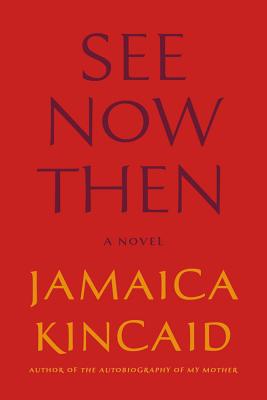Adam says, "Read this book"...
See Now Then by Jamaica Kincaid
In this brilliant and evocative new novel from Jamaica Kincaid—her first in ten years—a marriage is revealed in all its joys and agonies. This piercing examination of the manifold ways in which the passing of time operates on the human consciousness unfolds gracefully, and Kincaid inhabits each of her characters—a mother, a father, and their two children, living in a small village in New England—as they move, in their own minds, between the present, the past, and the future.
Here's what Adam has to say:
This is less a novel than an exercise in poetic monologue, in Voice
and Character--a darkly playful dirge-for-marriage shot through with
surprising laugh-aloud gallows humor; an engine burning the dense and
dangerous fuel of bitterness; a book only for the very brave and the
unhurried, for those willing to take a careful Orphic expedition
through an unsettling landscape where, perhaps, nothing at all may be
rescued.
In short, a middle-aged Jewish couple and their daughter
and son find the family dissolving, the marriage ending, and we see it
all through the eyes of the Caribbean, immigrant, writer-wife, in her
abandonment. In one sense, the novel's theme is marriage as culture
shock. In another sense, as the title suggests, Kincaid's story
centers around the way in which perception may become an exhausting
contest between memory, the past, and the-moment-now (and woe to those
who lose the battle, those who are punished with ego-incarceration,
with the hell of self-torment).
With its fetish for voice, its
complete rejection of plot in favor of rarefied
stream-of-consciousness or phenomenological narrative, this is the
sort of post-modern novel that makes you a little worried serious
literature really is going the way of much contemporary poetry, very
elite-minded and marginally accessible--yes, and yet it's also such a
damned good read, if you have the patience, if you will not (as I was
tempted to) overreact and shout: pretension! Be warned, this isn't a
book you can read through with good speed, at your normal clip; the
book demands that you allow it alone to call all the shots.
Kincaid
has produced, here, exactly the kind of novel other writers fear to
read, one with so strong a voice that it threatens to influence one's
own style in an un-asked-for manner.
In the end, what is it that
“See Now Then” leaves us with? Maybe just this. There are many
literary references to Greek mythology, and the narrator's
abandonment--as it hits home in the final section, left physically by
her husband, left emotionally by her children--conveys just how awful
a thing it is to be a god in whom no one any longer has faith, a deity
who has lost all her worshipers.
On a final, practical note: I recommend springing the extra six bucks
and buying the audio book on CD, which gives you the unforgettable
experience of hearing Kincaid read this work.


No comments:
Post a Comment